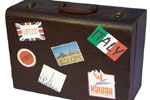Bag it up
The last thing you want after touching down at home or abroad is to find your luggage damaged, or even worse, missing completely. There are a few tips that the travellers in your company can follow to help recover baggage safely and in one piece.
 In the past, a suitcase damaged during a journey received rapid attention from the airline or handling agent and was soon replaced or repaired.
In the past, a suitcase damaged during a journey received rapid attention from the airline or handling agent and was soon replaced or repaired.
Increased security however, especially in the USA, means that more cases are opened behind the scenes, and the security staff concerned take no responsibility for damage caused in the process. For many years, American carriers have taken the view that luggage is designed to protect its contents and no compensation can be expected for a damaged suitcase.
 It’s not unusual for an innocently locked case to arrive on the carousel at the end of a journey with broken locks and a note inside indicating that the airline bears no responsibility for the damage.
It’s not unusual for an innocently locked case to arrive on the carousel at the end of a journey with broken locks and a note inside indicating that the airline bears no responsibility for the damage.
With this in mind, remember that all valuable articles – except sharp objects – should be carried in a passenger’s hand baggage and the suitcase should not be locked. Clear labels should be placed on the outside and inside of the case indicating the owner’s name and address.
Baggage has become a fashionable accessory with designers competing for market share. The most popular suitcases are sometimes picked up by the wrong traveller and it is often a good idea to choose a coloured case or tie a bright strap around a popular model to make sure that you pick up the right bag from the carousel.
 One way to make sure you recognise your luggage, and make a statement at the carousel, is to carry a unique item. Juli Hanslip of Towcester Leather Company (towesterleather.co.uk) provides leather travel items as promotional materials to companies such as Aston Martin, Coca Cola and Michelin. Juli uses leather from many countries, including South America, Turkey and India, to make unique designs which identify with the traveller. According to Juli, quality luggage speaks volumes and a high quality leather briefcase can expect to accompany an executive more often than their favourite tie.
One way to make sure you recognise your luggage, and make a statement at the carousel, is to carry a unique item. Juli Hanslip of Towcester Leather Company (towesterleather.co.uk) provides leather travel items as promotional materials to companies such as Aston Martin, Coca Cola and Michelin. Juli uses leather from many countries, including South America, Turkey and India, to make unique designs which identify with the traveller. According to Juli, quality luggage speaks volumes and a high quality leather briefcase can expect to accompany an executive more often than their favourite tie.
EasyJet operates one of the most efficient baggage irregularity systems. Any damaged suitcase is simply collected from the owner’s home or office by a courier and a replacement or repaired item is returned within a few days.
 In the event of delayed or lost baggage, there are set precise rules which dictate the compensation due to a passenger. This varies according to the route and period for which the passenger and luggage are parted.
In the event of delayed or lost baggage, there are set precise rules which dictate the compensation due to a passenger. This varies according to the route and period for which the passenger and luggage are parted.
Previous rules limited an airline’s responsibility to a maximum compensation of £280 or £14 per kg to a maximum of 20 kg. However the Montreal Convention, introduced on June 28th 2004, orders that the maximum claim is approximately £850 per person for lost luggage. The exact amount of compensation depends on currency fluctuation.
In the past, a bag was considered lost and not found after six weeks, but airlines now have to treat a bag as irrecoverable after three weeks. Most baggage, however, appears within 48 hours of being reported lost.
The additional cost of compensation is causing airlines to review their baggage handling procedures and it is not unusual for some carriers to request receipts for the contents listed.
Not only is it important to keep receipts for more valuable items but each traveller should record a list of contents for use in the event of lost baggage.
On a more positive note, it seems that hand baggage restrictions are more relaxed than for some time. On many carriers, including the low cost airlines, the 5 kg maximum allowance in economy class has been increased to 10 kg. However, the size of each item is still restricted and a cabin bag must fit comfortably under the seat in front of the passenger or in the overhead bin.
| Remember | |
|---|---|
|
|
Graeme Payne has trained on travel related subjects in over 60 countries around the world and has worked with hundreds of major companies, airlines and government departments to ensure that they manage their travel effectively. He currently writes for a number of travel magazines in UK and USA and is author of the annual International Luxury Travel Market catalogue.












